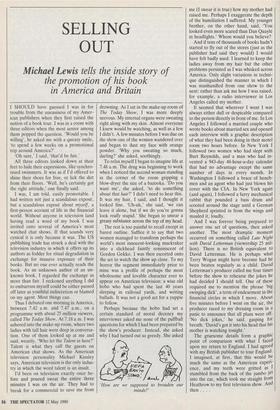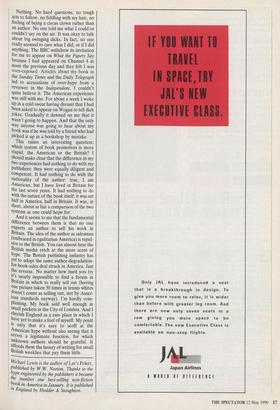SELLING OUT
Michael Lewis tells the inside story of
the promotion of his book in America and Britain
I SHOULD have guessed I was in for trouble from the uneasiness of my Amer- ican publishers when they first raised the notion of a book tour. I was in a room with three editors when the most senior among them popped the question. 'Would you be willing', he asked me with a queasy smile, `to spend a few weeks on a promotional trip around America?'
'Oh sure,' I said, `that'd be fun.'
All three editors looked down at their feet to hide their expressions, like synchro- nised swimmers. It was as if I'd offered to shine their shoes for free, or lick the dirt from their floors. 'Well, he's certainly got the right attitude,' one finally said.
I was, I am told, easily promotable. I had written not just a scandalous expose, but a scandalous expose about myself, a first-person account of life in the financial world. Without anyone in television land having read a word of my book I was invited onto several of America's most watched chat shows. If that sounds very cynical it is only because it was. The US publishing trade has struck a deal with the television industry in which it offers up its authors as fodder for ritual degradation in exchange for massive exposure of their books. But no one ever actually reads the book. As an unknown author of an un- known book, I regarded the exchange as more than fair. I reckoned anything I did to embarrass myself could be either passed off later as youthful indiscretion or blamed on my agent. Most things can.
Thus I debuted one morning in America, between 7.42 a.m. and 7.47 a.m., on a programme with about 25 million viewers, called The Today Show. At 7.18 a.m. I was ushered into the make-up room, where two ladies with tall hair were deep in conversa- tion. One of them looked up at me and said, wearily, 'Who let the Talent in here?' Talent is what they call the guests on American chat shows. As the American television personality Michael Kinsley says, American television is the only indus- try in which the word talent is an insult.
I'd been on television exactly once be- fore and poured sweat the entire three minutes I was on the air. They had to break for a commercial to save me from drowning. As I sat in the make-up room of The Today Show, I was more deeply nervous. My internal organs were sweating right along with my skin. Almost everyone I knew would be watching, as well as a few I didn't. A few minutes before I was due on the show one of the women wandered over and began to dust my face with orange powder. 'Why you sweating so much, darling?' she asked, soothingly.
To relax myself I began to imagine life at 7.48 a.m. The drug was beginning to work when I noticed the second woman standing in the corner of the room gripping a blow-dryer the size of a bazooka. 'Do you want me', she asked, `to do something about that hair?' I didn't need to hear this. It was my hair, I said, and I thought it looked fine. `Uh-uh,' she said, 'we can leave it alone, but if we do you're gonna look really stupid.' She began to smear a greasy substance across the top of my head.
The rest is too painful to recall except in barest outline. Suffice it to say that two women managed to transform perhaps the world's most innocent-looking muckraker into a slickhead faintly reminiscent of Gordon Gekko. I was then escorted onto the set to watch the show up close. To my horror the segment immediately prior to mine was a profile of perhaps the most wholesome and lovable character ever to appear on American television: a wise old hobo who had spent the last 40 years sleeping in railroad yards, and writing ballads. It was not a good act for a yuppie to follow.
Perhaps because the hobo had set a certain standard of moral decency my interviewer asked me none of the puffball questions for which I had been prepared by the show's producer. Instead, she asked why I had turned out so greedy. She asked How are we supposed to broaden our minds?' me (I swear it is true) how my mother had raised me. Perhaps I exaggerate the depth of the humiliation I suffered. My younger brother, on the other hand, said, 'You looked even more scared than Dan Quayle in headlights.' Whom would you believe?
And if tens of thousands of books hadn't started to fly out of the stores (just as the publisher had said they would) I would have felt badly used. I learned to keep the ladies away from my hair but the other problems persisted as I was whisked across America. Only slight variations in techni- que distinguished the manner in which I was manhandled from one show to the next: rather than ask me how I was raised, for example, a radio interviewer in Los Angeles called my mother.
It seemed that wherever I went I was always either dull or despicable compared to the person directly in front of me. In Los Angeles I followed a married couple who wrote books about married sex and opened each interview with a graphic description of what they had been doing in their motel room two hours before. In New York I followed two women who had slept with Burt Reynolds, and a man who had in- vented a 943-day 48-hour-a-day calendar that had no advantage except the same number of days in every month. In Washington I followed a brace of hench- men and an agent who had just blown his cover with the CIA. In New York again (and again), I followed a furry mechanical rabbit that pounded a bass drum and scooted around the stage until a German Shepherd sprinted in from the wings and mauled it, loudly.
And I was forever being prepared to answer one set of questions, then asked another. The most dramatic moment occurred on something called Late Night with David Letterman (viewership 25 mil- lion). There is no British equivalent to David Letterman. He is perhaps what Terry Wogan might have become had he been beaten regularly as a child. David Letterman's producer called me four times before the show to rehearse the jokes he had decided I should tell. One of these required me to mention the phrase 'big swinging dick', a term of endearment in the financial circles in which I move. About five minutes before I went on the air, the producer raced to my dressing room in a panic to announce that all plans were off. `No dick jokes,' he said. gasping for breath. 'David's got it into his head that his mother is watching tonight.' The gruesome details form a graphic point of comparison with what I faced upon my return to England. I had agreed with my British publisher to tour England. I imagined, at first, that this would be much the same as the American experi- ence, and my teeth were gritted as. I stumbled from the back of the jumbo jet into the car, which took me straight from Heathrow to my first television show. And then . . . .
Nothing. No hard questions, no tough acts to follow, no fiddling with my hair, no feeling of being a circus clown rather than an author. No one told me what I could or couldn't say on the air. It was okay to talk about big swinging dicks. In fact, no one really seemed to care what I did, or if I did anything. The BBC withdrew its invitation for me to appear on What the Papers Say because I had appeared on Channel 4 at noon the previous day and they felt I was over-exposed. Articles about my book in the Sunday Times and the Daily Telegraph led to accusations of over-hype from a reviewer in the Independent. I couldn't quite believe it. The American experience was still with me. For about a week I woke up in a cold sweat having dreamt that I had been asked to appear on Wogan to tell dick Jokes. Gradually it dawned on me that it wasn't going to happen. And that the only way anyone was going to hear about my book was if he was told by a friend who had picked it up in a bookshop by mistake.
This raises an interesting question: which system of book promotion is more stupid, the American or the British? I should make clear that the difference in my two experiences had nothing to do with my publishers: they were equally diligent and competent. It had nothing to do with the nationality of the author: true, I am American, but I have lived in Britain for the last seven years. It had nothing to do with the nature of the book itself: it was set half in America, half in Britain. It was, in short, about as fair a comparison of the two systems as one could hope for.
And it seems to me that the fundamental difference between them is that no one expects an author to sell his work in Britain. The idea of the author as salesman (embraced in egalitarian America) is repul- sive to the British. You can almost hear the British media retch at the mere scent of hype. The British publishing industry has yet to adopt the same author-degradation- for-book-sales deal struck in America. Just the reverse. No matter how hard you try It's nearly impossible to find a forum in Britain in which to really sell out (having one picture taken 50 times in tennis whites doesn't count as selling out, not by Amer- ican standards anyway). I'm hardly com-
plaining. My book sold well enough in small pockets in the City of London. And I cherish England as a rare place in which I have yet to make a fool of myself. My point Is only that it's easy to scoff at the American hype without also seeing that it serves a legitimate function, for which unknown authors should be grateful. It affords them the luxury of writing for small British weeklies that pay them little.
Michael Lewis is the author of Lar's Poker, published by W.W. Norton. Thanks to the hype engineered by the publishers it became the number one best-selling non-fiction book in America in January. It is published in England by Hodder & Stoughton.





























































 Previous page
Previous page